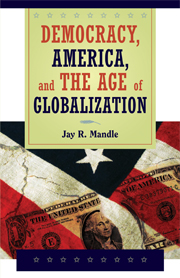6 - The Need for Public Financing
Published online by Cambridge University Press: 14 May 2010
Summary
In the United States, the power of wealth has illegitimately intruded into politics. While democracy should mean that policies are formulated in response to a consensus among citizens of equal political standing, our political system is one of inequality of influence and therefore biased political outcomes. The terms of the social contract required to ensure that justice prevails – namely, that the wealth created in the economy not be accorded disproportionate influence in the world of politics – are not in place. The relationship between the political and economic spheres needs to be reconfigured in order to provide deepened content to American democracy. Such a strengthening requires that the political domain must be equipped to resist the intrusion of private wealth. The problem of how to protect egalitarian politics from the power of wealth is a vexing one. But if political equality is to become a reality, this problem must be solved.
Markets create income inequality. Differences in the availability of and demand for skills mean that some degree of wage inequality will always exist. Since, in addition, the ownership of income-earning property typically is highly concentrated, capital markets are also sources of inequality. There is no escaping the reality that economic inequality is a fact of life in market-dominated economies.
The result is an unavoidable tension between democracy's required egalitarianism and the antiegalitarian pressures that emanate from the economy. The reason for this tension is that the rules governing the economy are written in the political arena.
- Type
- Chapter
- Information
- Democracy, America, and the Age of Globalization , pp. 109 - 130Publisher: Cambridge University PressPrint publication year: 2007

